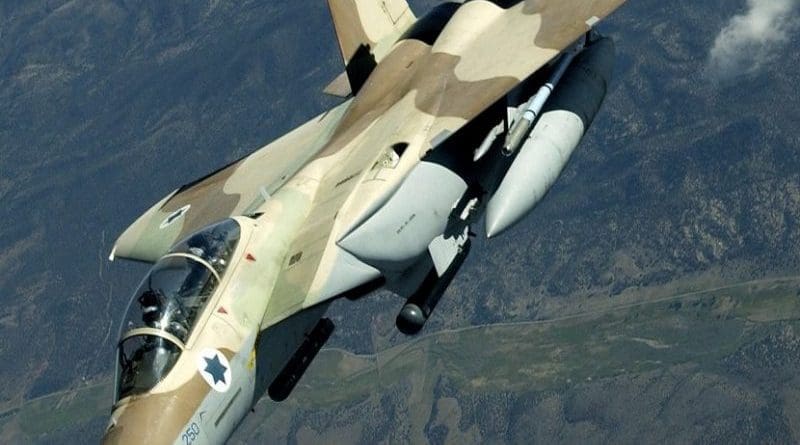Israel Claims Iranian Missiles Struck Golan Heights, Prompting Retaliation
By RFE RL
(RFE/RL) — Israel’s military claims that Iranian forces based in Syria fired about 20 missiles at Israeli army outposts in the Golan Heights, prompting retaliatory strikes by Israel.
The military said early on May 10 that the missiles caused minimal damages and no casualties in Israel, and Israeli defense systems intercepted “some” of the incoming rockets.
The attack, which was confirmed by Syrian state media, prompted air raid sirens to go off in the Golan Heights.
Israeli Lieutenant Colonel Jonathan Conricus claimed the missiles were fired by the Quds Force, an external arm of the Iranian Revolutionary Guards Corps.
“The Israeli army takes very seriously this Iranian attack against Israel,” he told reporters in Jerusalem. “We have retaliated, but I have no further details about this… This event is not over.”
Syria’s state news agency reported early on May 10 that Israel launched dozens of rockets into Damascus and other areas of Syria, destroying a radar installation and hitting an ammunitions dump.
The scale of Israeli fire appeared to be far higher than in previous incidents. Damascus residents said a series of explosions shook the city just before dawn.
An Israeli army spokesman said on Twitter that Israel was “acting against Iranian targets in Syria.” Iran did not immediately comment on the Israeli claims.
The Syrian Observatory for Human Rights, a war monitor, said that Israeli planes and missiles were also seen targeting military sites in the Queintra region on the Syrian side of the border.
Activists in Queintra said it was artillery fire from Israeli positions in the Golan Heights. There were no reports of casualties.
The exchange of fire comes one day after Syria accused Israel of launching missile strikes targeting an Iranian military outpost in Kisweh, south of Damascus.
According to the observatory, 15 people were killed by the strikes on May 9, among them eight Iranian fighters.
Last month, an attack on Syria’s T4 air base in Homs province killed seven Iranian military personnel, and Israel was accused of striking government outposts in northern Syria, killing more than a dozen pro-government fighters, many of them Iranians.
Israel has neither confirmed nor denied most of the air strikes. But for months, it has repeatedly said it will not accept a permanent Iranian military presence in Syria.
Iran has vowed to take revenge for the strikes attributed to Israel, which have killed not only many Iranian troops but members of Lebanon’s Hizballah militia stationed in Syria to support President Bashar al-Assad in his seven-year civil war against Sunni rebels.
Israel has been on heightened alert in recent days, putting its forces along the northern border on high combat alert, activating air defenses, and ordering the unsealing of bomb shelters in anticipation of possible Iranian retaliation against the strikes.
The Israeli military said the measures were needed because of what it described as “unusual movements” of Iranian forces in Syria.
With the combined forces of Hizballah, Iran, Russia, and Syria making significant gains in the fighting this year, Israeli officials have said they fear that Iran and tens of thousands of allied Shi’ite militiamen will start carrying out attacks against Israel.
“They want to build a second Hizballah-stan” in Syria, Amos Gilead, a retired senior Israeli defense official, told a security conference in the coastal town of Herzliya recently. “They are determined to do it and we are determined to prevent it. It means we are on a collision course.”
While periodically staging raids on Syrian and Iranian positions, Israel’s military has maintained close communications with the Russian military stationed in Syria to back Assad, and has avoided striking any Russian installations.
Israeli Prime Minister Benjamin Netanyahu traveled to Moscow on May 9 to meet with President Vladimir Putin and discuss military coordination in Syria.
After visiting with Putin for 10 hours, Netanyahu said he conveyed what he described as Israel’s obligation to defend itself against Iranian aggression in Syria.
“I think that matters were presented in a direct and forthright manner, and this is important. These matters are very important to Israel’s security at all times and especially at this time,” he said.
“[Iranians] are trying to transfer forces and deadly weapons [to Syria] with the explicit goal of attacking the state of Israel as part of their strategy to destroy the state of Israel,” he said.
Netanyahu said his meetings with Putin “are always important and this one is especially so… In light of what is currently happening in Syria, it is necessary to ensure the continued coordination” between the two militaries.

